Mr President, Chief Justice and President McMurdo, members of the judiciary, guests, colleagues and friends, I am told that being asked to make this toast to the judiciary is a great honour. From where I stand it looks much more like a potentially career ending opportunity.
From the President’s opening remarks you may realise that I come to be in this position as a result of sweet revenge. A few of you would know that I was indeed admitted to practice as a barrister on the same day as the President Mr Douglas SC, who has placed me in this invidious position. In fact, the President was admitted one before me, as the Barristers Roll will confirm.
Perhaps I might be permitted to digress in this regard.
I can confirm he did lend me the $200 admission fee. It was paid back which had more to do with the amount than my then financial responsibilities: any less I would not have bothered: any more I could not have afforded the repayment.
Our admissions came after we had worked in chambers side by side as judges’ associates for a couple of years. He had worked for his distant relative Justice James Douglas (or Jumbo as he was affectionately called by Richard) and I had worked for the Campbells, firstly Sir Walter Campbell and then DM Campbell J (as they were affectionately called by me).
It may come as a surprise to some that my wants, needs and activities as an associate were somewhat different from those of Richard, indeed the astute amongst you may have noticed I am, frankly, somewhat different from Richard. Richard is bold and confronting; I am shy and retiring. Richard married well… above his station; and I married well… frequently. Richard finished his education in Townsville; I did so at Cambridge.
But I digress, let us go back to our time as associates.
While we both faithfully served our judicial masters while completing our legal studies, I tended to require more recreation than Richard. After about 18 months I did manage to get Richard to come to the then Criterion Hotel for a steak and a couple of beers one lunch time. When we returned, Richard went off to do some errand for his judge.
As I sat satisfied in my associate’s room, the heavy foot fall of Justice Douglas aroused my attention:
“Where’s Richard?”
he said in his characteristic gravelly voice.
Doing the best I could to assist in this tense situation, I indicated that I thought he had gone to the pub for lunch.
Within a few minutes Richard returned, no doubt from his errand, to be greeted by a hissing Justice Douglas with the words that I shall never forget:
“………………..Richard where have you been? You are supposed to be my bloody associate!”
Richard has never forgiven me — although, as is obvious to all, tough love has been good for Richard.
It would be remiss of me not to mention, however, that not only the Bar but also the Bench are lucky to have someone of Richard’s courage, energy and forthrightness to serve as President of the Bar Association.
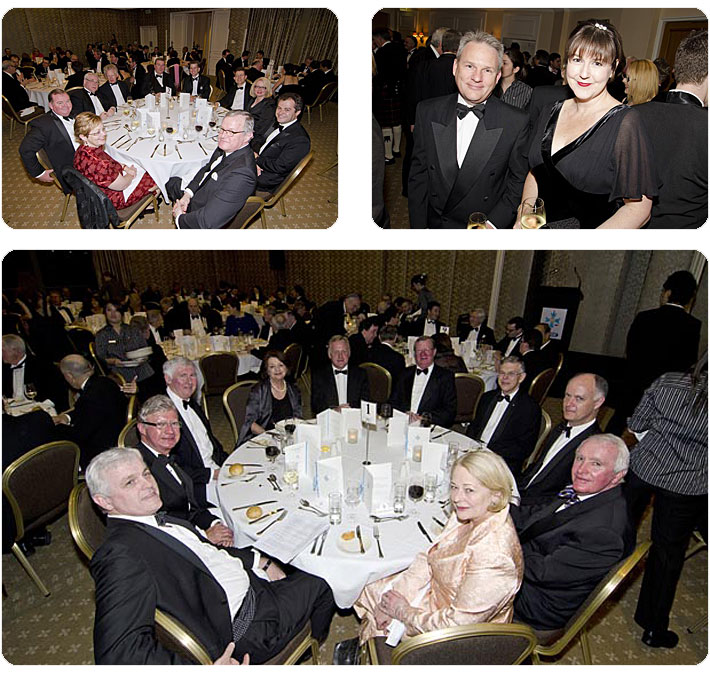 It is indeed a privilege to be asked to give this toast tonight because of the great respect and affection I have for a number of judges before whom I have appeared and with whom I have enjoyed many extramural activities.
It is indeed a privilege to be asked to give this toast tonight because of the great respect and affection I have for a number of judges before whom I have appeared and with whom I have enjoyed many extramural activities.
The society of judges has much to recommend it. Why just a couple of days ago I was sharing a couple of beers at the newly refurbished Grosvenor Hotel with my good friend Justice X. We were enjoying the view, when, as luck would have it, we were interrupted by Justice Y.
What followed was an interesting conversation about the finer points of the law of unjust enrichment particularly in its application to modern entertainment venues. I found it edifying.
On a more serious note I, like many of my colleagues at the Bar, remain sincerely grateful for the industry of many judges as, through that industry, it is possible for all at the Bar to advance the cause of justice and, in passing, to earn a decent living!
In this regard through the good offices of my chamber mates Plunkett and Amerena (who sit on the Bar Council) I have been provided with recent statistics in a report from the steering committee for the Review of Government Service Provision (also known as the Productivity Commission). The report makes it clear that in terms of net recurrent expenditure (of tax payers’ money) on the finalization of matters commenced in court, Queensland’s Supreme, District and Magistrates Courts are (with one minor exception) the most efficient of all the Courts in Australia in terms of the cost of disposal of both civil and criminal matters. That is so notwithstanding that Queensland has the lowest number of judicial officers per 100,000 people in the country.
These statistics confirm that, in the main, our judges and magistrates are working hard indeed.
The relationship between members of the Bar and the Bench is of course not always purely at a professional level.
In individual circumstances the relationship between barristers and judges is often personal and involves deep friendships and respect often originating from times shared at the Bar. From time to time it does involve, regrettably but inevitably (probably through the adversarial nature of our profession) rivalries, animosity and occasional disrespect.
It has occurred to me that in making this toast to the Judiciary I should take this opportunity to share with you some of my own personal experiences with members of the Bench over the years. It will remind us all that nothing said or done in Court goes unnoticed — particularly by the young and impressionable.
It would be remiss of me not to mention that Justice Chesterman is to respond to this toast. This is not the first time that Justice Chesterman has had the last say with respect to my submissions. He and I meet regularly in the Court of Appeal where, as tonight, His Honour has the last say.
Perhaps the only difference this evening is, I may be allowed to get out what I want to say without the generally helpful, and certainly prolific, interruptions, which we have all come to know and love in the Court of Appeal.
Justice Chesterman, during a recent conversation suggested that in view of the prevalence of mediation and alternative dispute resolution he might speak of the “missing” judge or the “disappearing” judge. Perhaps in view of the few anecdotes I intend to relate, I might be seen as speaking about not the “missing” judge but the “kissing” judge or the “hissing” judge.
Being in my 50’s, I (like many of you here tonight) have seen judges over nearly four decades. I have seen them kiss, and I have seen them hiss at, the advocates before them.
In early days many of the judges were veterans; many were larger than life, many of them were eccentric; many were very well read; and many of them were charming. Most (but not all) tended to kiss rather than hiss.
In terms of all of those characteristics the late Justice GAG Lucas springs to mind.
I well remember sitting as an associate in the old Full Court one hot summer’s afternoon when the late Trevor Hartigan was appearing for a prisoner pleading an appeal against sentence. Hartigan was attempting to demonstrate that his client was intoxicated, and perhaps not fully in command of his actions as a relevant matter to be taken into account in mitigation of penalty. Some may recall that Hartigan had from time to time a habit of pausing, almost stuttering over words.
On this sleepy Friday afternoon, Hartigan said to the Court:
“And so, and so, and so your Honours, by the time of the offence my client had drunk, had drunk, six stubbies of beer and a bottle of Bodega which shows, which shows…”
At which time Justice Lucas leaned back and said, quite audibly, to Sir Walter Campbell:
“Which shows remarkably poor taste in Champagne.”Â
Working with Sir Walter Campbell was indeed a great pleasure, although His Honour was capable of kissing with his wonderful enjoyment of life, he was also capable of hissing.
Let me tell an associate’s tale.
The more senior amongst you will remember the dreadful process of “noting up”. In the dark ages before the computer “on-line” legal research, every few months legal publishers would circulate sheets of small sticky bits of paper to be pulled apart and inserted in law reports indicating that a particular decision had been discussed or followed, affirmed, distinguished or not followed. The process of putting these sticky bits of paper in the reports was tedious and despicable, but judges’ associates (even Richard Douglas who was supposed to be Justice Douglas’ associate) were expected to do it.
My period of associateship with Sir Walter followed associateships by Sir Walter’s late daughter Deborah and his son our colleague Wallace who, because of their filial relationship, seemed to have neglected the tedium of noting up and, to be frank, got away with it.
A few months into my term as associate Sir Walter asked of me: “Hughes, have you got the ‘noting up’ all up to date?”
Thereafter, the conversation went like this:
Hughes to Sir Walter: “Sir Walter do you know why the devil was sent to hell?”
Sir Walter to Hughes: “No, why?”
Hughes to Sir Walter: “For asking questions he knew the answer to.”
At this point Sir Walter hissed words which I found curious coming from a Campbell (and a leader of the Clan to boot!): “You and your bloody Scottish mother.”
In terms of hissing as an associate I also had the educative experience of watching the late Justice Peter Connolly savaging the dapper Des Derrington Q.C. — which was my initial introduction to the notion that the Bar/Bench game did not always involve beer and skittles!
I enjoyed my period as associate very much. I had the privilege of meeting and working with many very worldly and interesting judges, most of whom had served their country during the second war and many of whom, perhaps because the times were less complicated, maintained active interests outside the law which I can’t but help think assisted in their capacity to determine the worldly matters before them.
My first decade at the Bar involved sharing chambers with Sandy Thompson S.C. and Justice White and Chief Judge Wolfe (as they then weren’t). I hasten to add that in chambers there was definitely no kissing and no hissing — only hard work and the occasional glass of champagne on special days such as Justice White’s birthday which (as the Chief Judge often remarked) was an anniversary which had occurred so much more often than her own.
There is much I could say about both those now distinguished women jurists but, as they were not judges at the time, Justice Chesterman would no doubt rule any such stories as irrelevant and “of no assistance“. I will say that I grew up thinking that about half the Bar was (or should have been) women!
Life in Court at the Junior Bar again brought examples of both the kissing and hissing judge. First a hiss.
When I had been at the Bar a few years I had a chamber matter against the Late Bob Douglas QC before none other than Justice Moynihan, whose recent reforms and recommendations have, I understand, done much to endear him to our colleagues at the Criminal Bar. In front of a crowded callover when my matter against Douglas QC was mentioned I informed the Court that the application involved the construction of a particular document to which His Honour, who perhaps had read the file in detail, or perhaps not, responded in hissing tones:
“No it’s not Mr Hughes and if you had read your brief before you stood up you would know that it is not.”
A feeling of complete relaxation came over me. Every barrister fears that he will be professionally maligned, if not publicly defamed, in front of his colleagues because he may have made some terrible error or been otherwise derelict. When, as it did that day, accusations actually arise, all of a sudden the fear leaves one. Didn’t seem that bad after all. The earth did not open up and swallow me, nor did the sky fall.
The interesting and, for me, charming conclusion to this anecdote is that about a week later, after Justice Moynihan had reserved his decision, he delivered reasons for judgment (an occasion, obviously before lunch, at which both Douglas QC and I attended). I won the application (one of the few so I remember it) on the basis of the very construction point that I had been belittled for announcing at the callover. After allowing the application His Honour stood up and was lumbering out of Court when I interrupted him and (echoing the timid voice of Dickens’ Oliver asking for “more”!) asked:
“Your Honour, please could I have my costs?”
His Honour with all the charm of an unhappy Irishman turned to Douglas QC and said:
“I suppose there is no reason why HE can’t have HIS costs.”
There were also many hissing experiences in the early days of the Court of Appeal (now 20 years old and now presided over by a President who is a woman with a remarkable and commendable judicial temperament).
It was not always thus. While President Fitzgerald and Justices Pincus and Davies were all capable of hissing perhaps the most aggressive tactic was that of the then President Fitzgerald involving no sound at all. When faced with a submission he did not like, or with a refusal by Counsel to make some concession, His Honour, as many of you may recall, had a wonderful habit of turning his back to the Bar table so that we were presented with the rear of the judicial chair — perhaps the least attractive aspect of the judicial vision.
Such judicial behaviour contrasted with that of the then Chief Justice Macrossan — a master of gentle persuasion who, when unimpressed with a proposition would enquire whether one had “any other points, perhaps even better ones!” The present Chief Justice, I am pleased to acknowledge, carries on that tradition of appropriate judicial demeanour.
I witnessed firsthand many hissing experiences in the trial courts, particularly at the hands of the notorious McLaughlin brothers, but now let me speak of a kissing experience at first instance.
On a Friday morning pleading guilty before a judge then unknown to me by the name of Nelson Anthony Skoien, I was briefed to appear for an 18 year old girl charged with breaking and entering. She was a heroin addict and tragically, been since the age of 14. She had, shortly before the sentence, found her way onto the methadone programme and was making progress. The concern was to endeavour to ensure that she did not receive a custodial sentence.
With the enthusiasm of a young barrister on a Friday morning (intent on heading to the Milano Restaurant for lunch) I was explaining to His Honour that like Orpheus she had left the underworld of heroin and was making good progress but that if she had to look backwards, or take a backward step involving, for example, the underworld of the prison cell, she would… and before I could finish the sentence His Honour interrupted and said:
“She would lose her Eurydice Mr Hughes. I understand what you are saying, your client will not be receiving a custodial sentence.”
At that point I sat down and thought what an interesting and well read man.
His Honour Judge Skoien and I became friends and enjoyed wonderful times together. We travelled together particularly in France and Ireland, and over the years I have developed a great respect for him both professionally and personally. I appeared before His Honour often in the Planning Court and, to this day, I am left with the impression that there were cases which I perhaps should have won but didn’t because His Honour was very keen to ensure that, notwithstanding our friendship, I was suitably professionally chastened from time to time by hissing out unfavourable decisions!
I might add there are judges in the Court of Appeal who attend to the very same chastening without regard to any particular level of friendship.
Ultimately of course, being a sensitive soul, His Honour Judge Skoien kissed me (perhaps the kiss of death) by saying one day:
“Hughes, we have eaten together, we have socialised together, we have travelled together, we are quite good friends now. I am thinking of disqualifying myself from matters in which you are appearing.”
In an immediate horrified response I exclaimed:
“For God’s sake don’t do that – the judges that hate me don’t disqualify themselves!”
God willing, in the future there will be maintained a formal friendship between the Bar and the Bench, particularly when those institutions are in the custody of the likes of the present Chief Justice and Mr Douglas S.C. There will also be less formal friendships between barristers and judges.
Inevitable there will be animosity too. Such is the nature of an adversarial system which by its nature is imperfect — only because it exists to serve imperfect creatures and, let us be frank, because it is manned by, generally well-meaning, but imperfect creatures — all of us here tonight.
If I may, in conclusion, be permitted a few gentle observations.
In this era the law and legal processes are under attack:
(a) first, by a media which is more interested in short term sensationalisation, than even a medium term search for the truth; and
(b) second, by Governments which by their actions (particularly underfunding) fail to recognize the importance of a well run and respected Court system.
At the risk of sounding like an aging black soul singer it seems to me that it is important that the relationship between the Bar and the Bench, in such times, be built on respect.
At this point I should probably burst into a few lines from the song made famous by Aretha Franklin of the same name, but I won’t (although I don’t wish to discourage Justice Chesterman from singing or dancing as part of his act).
As part of that matrix of respect, all I ask of you, the members of the Bench here tonight, is that you bring to your presence in court not just a firmness to protect the resources of the Court and dispose of matters quickly but also a special patience and a judicial bearing.
There is no good reason for judges not to act with politeness as well as firmness.
Most of you have reached your position because of your undoubted intellectual capacity and legal knowledge. Some of us at the Bar, doing the best we can, cannot necessarily emulate those qualities.
As I said to some colleagues recently, I am often put in mind of those wonderful opening words of F. Scott Fitzgerald’s “The Great Gatsby”:
In my younger and more vulnerable years my father gave me some advice that I have been turning over in my mind ever since.
“Whenever you feel like criticizing anyone” he told me, “just remember that all the people in this world haven’t had the advantages that you’ve had”.
There is no doubt in my mind that the best results, in terms of serving the true interests of the community which relies upon the legal system under which we operate, are likely to be wrought through cooperation between the Bar and the Bench.
I think, in the adversarial system in which we work, the intellectual process is better served by the Bench, attempting to assist competing counsel to refine the competing arguments to their highest form, rather than denigrating one or other, or both, of the arguments without some careful, albeit perhaps limited, investigation.
It is when arguments and propositions undergo scrutiny by such an interactive process, conducted with civility, that they can be properly refined and then properly exposed – revealing their merits and their inadequacies.
That said, there is no doubt that the barristers of Queensland are lucky to have hard working judges and magistrates to assist us look after and defend our clients’ rights and interests (and to feed our families!)
Ladies and Gentlemen I ask you to be upstanding and toast our friends the Judiciary.
We join to farewell our colleague the Far Northern Judge, Justice Jones, upon his retirement from the Supreme Court. We do so with regret at his departure, but also gratitude for his contribution.
Justice Jones is highly respected by all his colleagues. Consistently, Judges who cannot be present here today are present in a virtual sense, by video-link from Brisbane, Rockhampton and Townsville. All Judges would wish to be associated with the observations I am about to make.
In welcoming all persons present this morning, I particularly note the presence of the Honourable the Deputy Premier and Attorney-General, Chief Justice Keane and Justice Dowsett of the Federal Court of Australia, both former members of this court, Judges of the District Court, the Chief Magistrate and Magistrates, retired Judges, Land Court member Mr Cochrane, Mayor Val Schier, Members of Parliament, Bishop Foley, Consuls and the Far Northern Judge Designate, Mr Jim Henry SC.
Justice Jones joined the Supreme Court on 2 October 1997, following a distinguished 33 year career in the practising profession, mostly as Counsel, and for the last 8 years as Queen’s Counsel. His Honour practised from Rockhampton, to which he contributed substantially, including as Chancellor for 13 years of Central Queensland University. That community contribution, and many others, were recognized by the nation in the year 2005 with his appointment as an Officer of the Order of Australia. He has also been awarded two honorary doctorates.
Justice Jones has discharged his judicial duties with great distinction. It is upon his role as the inaugural Far Northern Judge that I should dwell for a moment this morning.
Our colleague has established and developed the role of Far Northern Judge with great effectiveness, not only in accomplishing the heavy workload of this busy Supreme Court centre, but additionally, in presenting the Supreme Court to the regional community for the significant institution which it is. He has readily and regularly interacted in many ways with the civil community at all levels of government, at schools and the University, and through other community organizations, to the point where he is very well-known and respected as a fine community leader. Like the recently retired Northern Judge Justice Cullinane, Justice Jones has willingly embraced this aspect of the role of resident regional Supreme Court Judge, and what he has done has served to enhance community awareness of the work of the judicial branch of government at this high level, and reinforced respect for the court and its responsibility in the delivery of justice according to law and the maintenance of the rule of law.
In all these endeavours, our colleague has been greatly supported by his wife Helena, for whom all within the Supreme Court community feel great affection. Justice and Mrs Jones leave that community now with the warm appreciation of the court, and the Queensland, especially the Far North Queensland, community. We wish them all the very best as they embark upon a new chapter of their lives together.
The following speech was delivered by Karalyn Shaw, a former associate of the Justice Jones, on behalf of all of his associates, at his Honour’s recent retirement dinner.
Distinguished guests, ladies and gentleman.
In thanking you tonight on behalf of all your Associates, Judge, I would like to take the liberty of drawing on a few personal reflections.
When I first came to work with you, something which resonated deeply with me was the duality of your distinguished career devoted not only to the law but also to education. My parents firmly instilled in me their guiding philosophy that perhaps the greatest gifts anyone can impart are time and education and as your Associate, I had the privileged position, of being able to fully appreciate and admire first-hand, the extent of your service to both these fields.
Your Associates benefitted greatly from the combination of these prevailing interests in your life. To us, you were not only an astute, highly accomplished legal mind, also dedicated to the furtherance of higher education in this country, through your role as Chancellor of CQU for many years, but also, an impassioned teacher of the law, of the world and of life.
You never missed an opportunity to explain a complex rule of procedure, evidence or advocacy, enlighten us as to the etymology of a word or assist with our Latin pronunciation and derivation. You shared your immense general knowledge and taught us of geography, history, human rights, literature, poetry, music and art. We learned the importance of not judging prematurely, being compassionate, keeping an open mind and a sense of humour.
Some of my fondest memories range from our discussing and debating points of law and argument in the corridor between Chambers and Court – you encouraging me to reason, to question and to think – to our travels, circuits, French language, the finer things in life – fine wines, cuisine, whiskey and champagne (which was always all the sweeter at the end of a pile of reserved judgments)!
Concomitant with all this was your willingness to make time for us as individuals.You always made time to listen.
We hope, Judge, during our service to you, we contributed to a consummate teacher pupil symbiosis through our research, writing, proof-reading, organisational, people and I.T. skills not to mention ever-willing practical, helping hands and our individual natures, interests and experiences.
Being a Judge’s Associate is a position of immense privilege and equally, one of responsibility and trust. During our tenure, we shared in your day to day life and consequently came to meet, work with and know others close to you, including your family, colleagues and especially, your dedicated secretary, Di Chambers. I also wanted to extend our thanks to Di, Helena and all the Jones family for all they did in accommodating, guiding and assisting us.
An investment in education returns an immeasurable richness. Judge, we are all the more rich and feel truly privileged for working with and getting to know you. You have a fine mind and are a true gentleman – ever-patient and ever-courteous. We are all immensely grateful for your tutelage and time.
May you be richly rewarded in your retirement with contentment and fulfillment, for all you have given throughout your distinguished career to your profession, the
community and to others, generally.
I now ask if you would accept this gift from me, on behalf of all of your Associates, as a token of our gratitude.
Karalyn Shaw (nee Orr) BA LLB (UQ) LLM (QUT)
Associate to The Honourable Justice S.G. Jones AO 2001
In welcoming all persons present this morning, I particularly note the presence of the Honourable the Deputy Premier and Attorney-General by video link from Brisbane. I know the Deputy Premier regrets his inability because of another Brisbane commitment to be here in Cairns: he told me that yesterday. I record the court’s appreciation for his attendance at recent court ceremonies in Townsville and here in Cairns as recently as 2 September.
All members of the court who can be present are here today, either directly or by video link from Brisbane: all would wish to be associated with my following remarks.
I note the presence in Brisbane of Judges of the Federal and Family Courts, the Chief Judge and the Chief Magistrate, other Judges and Magistrates; and here in Cairns, the Director-General, the Crown Solicitor, local member Ms Desley Boyle, the Deputy Mayor, Deputy Chancellor of James Cook University, my personal long-standing friends and distinguished citizens of Far North Queensland and the State, Mr George Chapman and Mrs Margot Chapman, and the Editor of the Cairns Post Mr Nick Trompf. The news media play a potentially very important role in disseminating information about the work of the courts, and I gratefully acknowledge the significance of the Editor’s presence today.
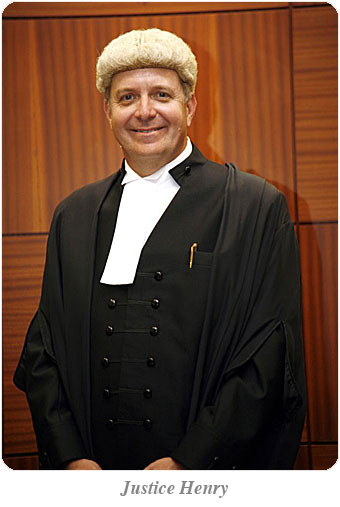 I mention in that regard that the Chief Justice of Canada is to present an address in the Banco Court in Brisbane tomorrow evening on the subject “The Courts and the Media”, which I am sure will be most interesting, and a great honour to the court in this its sesquicentenary year.
I mention in that regard that the Chief Justice of Canada is to present an address in the Banco Court in Brisbane tomorrow evening on the subject “The Courts and the Media”, which I am sure will be most interesting, and a great honour to the court in this its sesquicentenary year.
I spoke yesterday with Chief Justice Keane of the Federal Court, who asked me to record his apology. That His Honour has attended recent ceremonies in Townsville and Cairns bespeaks a level of respect and support for this court which is greatly appreciated, and reciprocated.
We warmly welcome Justice Henry to the Supreme Court, and congratulate him upon his appointment as the 111th Judge to be appointed to the court in its 150 year history, and the second Far Northern Judge. Falling in this significant year, and following upon the conspicuously effective 14 year term of the first Far Northern Judge, Justice Jones, whose presence today I acknowledge, the appointment is redolent of history and promise.
As to the latter characteristic, Justice Henry is undoubtedly very well qualified for this important appointment.
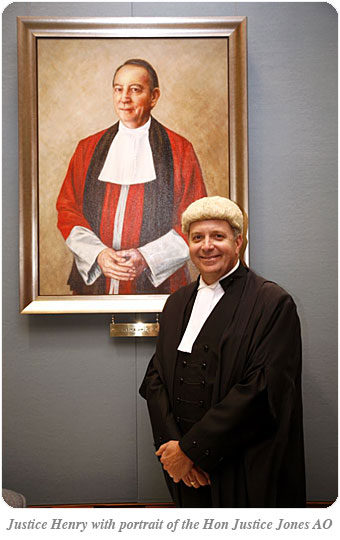 Educated in regional Queensland and graduating in Arts and Law from the University of Queensland, His Honour was admitted to the Bar in 1986, developing a specialist criminal practice in the Crown service, in which he continued until the year 2000, when he entered into private practice in Cairns. His practice then diversified to cover most areas of the law. My information and belief is that he is highly regarded by his professional colleagues for his legal learning and experience, balance, and capacity for hard work. In that last respect, I note this is a particularly busy Supreme Court centre.
Educated in regional Queensland and graduating in Arts and Law from the University of Queensland, His Honour was admitted to the Bar in 1986, developing a specialist criminal practice in the Crown service, in which he continued until the year 2000, when he entered into private practice in Cairns. His practice then diversified to cover most areas of the law. My information and belief is that he is highly regarded by his professional colleagues for his legal learning and experience, balance, and capacity for hard work. In that last respect, I note this is a particularly busy Supreme Court centre.
During those years in Far North Queensland, Justice Henry has commendably been involved in community life, for example chairing the Cairns State High School Council since the year 2008.
I expect that 11 years “on the ground” qualifies His Honour as a Far North Queenslander. He now embraces a unique opportunity to leave his beneficial mark on the region — potentially for as long as 21 years.
I have spoken on other occasions about the central importance of Supreme Court appointments to regional centres, where the Judge operates without the direct collegial support characteristic of the court in Brisbane, and where the Judge daily presents as the sole face in the region of this significant institution. That is of course not to suggest that a regional judge is divorced in some way from the rest of the court: far from it, the court exhibits strong cohesion State-wide. But those features do 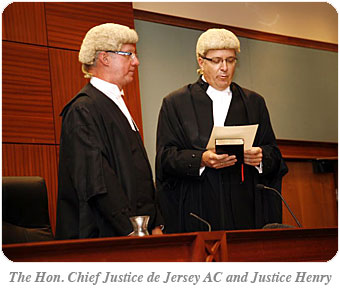 nevertheless combine to render regional appointments especially significant. Throughout my judicial career, the regions and the State have been very well served by the regional Judges, who have additionally assumed with great impact high leadership roles in relation to the regional professions, including the judiciary, and the regional communities. I am confident Justice Henry will do likewise.
nevertheless combine to render regional appointments especially significant. Throughout my judicial career, the regions and the State have been very well served by the regional Judges, who have additionally assumed with great impact high leadership roles in relation to the regional professions, including the judiciary, and the regional communities. I am confident Justice Henry will do likewise.
That extends to collegial interaction with the Judges of the District Court and the Magistracy, whose dedication is greatly valued. I have always been especially gratified by the support for these occasions of the Chief Judge and Chief Magistrate, signifying a State-wide court cohesion which is not only personally pleasant, but has, as well, produced some publicly worthwhile outcomes.
That this ceremony takes place in Cairns rather than Brisbane signifies the court’s acknowledgement of the regional significance of which I have spoken this morning. That all Judges are present by one means or other, signifies the Far Northern Judge’s membership within a State-wide court of 26 members, collegially bound to the optimal delivery of justice according to law throughout the State.
We all warmly welcome Justice Henry to the court, and we warmly welcome Mrs Kate Henry to the court community.
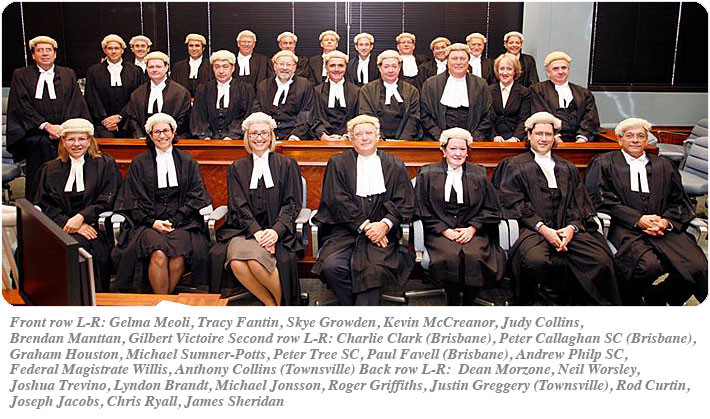
Mr Hughes, Mr Douglas President of the Bar Association, your Honours, ladies and gentlemen. Before responding to the toast proposed so eloquently by Mr Hughes may I express my thanks to the President and the Bar Council for their invitation to address this important occasion in the life of the Bar, and the bench. I am conscious of the honour you confer on me.
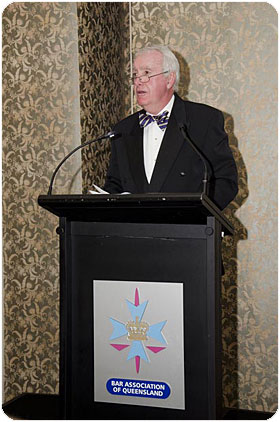 The judges are, of course, indebted to Mr Hughes for his good natured toast and for the confidence, which I think he has expressed, in our capacity to perform our arduous duty. We judges are human. Part of our human frailty is to enjoy flattery and Mr Hughes is practised in those arts. He may indeed have learned something from Justice White’s address last year.
The judges are, of course, indebted to Mr Hughes for his good natured toast and for the confidence, which I think he has expressed, in our capacity to perform our arduous duty. We judges are human. Part of our human frailty is to enjoy flattery and Mr Hughes is practised in those arts. He may indeed have learned something from Justice White’s address last year.
I enjoyed listening to Mr Hughes, but as I listened I began to wonder why he bothered. I mean by that I wondered why the Bar continues with this venerable tradition of inviting judges to its convocation of collegiality, when judges as a class are becoming irrelevant to the manner in which most of you now practice your profession.
I do not wish to sound ungracious, nor to doubt the sincerity of the invitation you extend to Her Majesty’s judges. We all appreciate being among you and experiencing the conviviality of the Bar. But why do you ask us?
We are all familiar with the concept of the vanishing trial. An inevitable consequence of that phenomenon is the vanishing judge. We are disappearing behind notices of claim, statutory exhortations to settle early and often, pre-trial procedures designed to prevent actions coming on for trial, single expert reports and practice directions now so numerous and complex that there will shortly be a need for a practice direction about how to comply with practice directions. The manifest purpose of these measures is to ensure that the investigation of fact and law which used to occur at a trial now occurs before a claim can be issued so that the sense of catharsis and satisfaction counsel used to feel at the conclusion of a successful cross-examination, or a triumphant address which has brought a sceptical judge to the point of persuasion, now comes with the filing of the claim.
So I repeat the question I posed earlier: why do you persist with the toast to the judiciary?
I have not mentioned the phenomenon of mediation which is perhaps the single most important cause in the decline of the trial. I do not criticise mediation or mediators. How could I? My very great friend Ian Hanger is among us. I simply make the point that as mediation flourishes litigation withers. But mediation may provide an answer to my question. Mediation needs judges. If judges entirely vanished you would have to invent us. We are needed, as the Bastille was needed, as a symbolic source of dread against which to revolt. Without the threat that judges exist, and might actually try a case, mediations would fail.
I believe I know how they work. The mediator’s opening gambit is to ask each of the parties how much they have spent to date. The figures are given, added up, and then rounded up to the next highest $100,000, or perhaps the one after that. A look of polite surprise comes to the mediator’s face as he says “judges are expensive, aren’t they?”
If that does not work you say worse things about us. You put us into categories, and say to the parties that if the case is not settled it will be tried by a judge (a) from whom they will never get a judgment; or (b) from whom they will get a judgment, but the wrong one; or (c), from a judge who will give the right judgment but at such high personal cost that the health of counsel and client may not recover for a year.
If any of my judicial colleagues present is uncertain of the category into which you have been put, I suggest you turn to the barrister nearest to you, and ask.
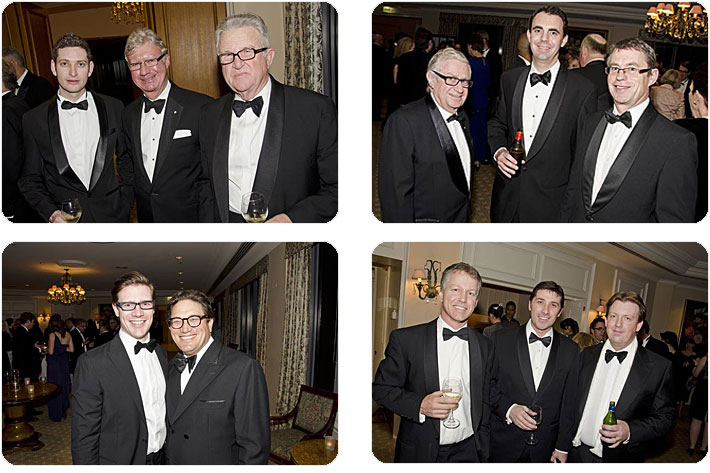 There may be another reason why you drink our health. It may be that you are profoundly grateful that we are not worse than we are. Bye and large the judges before whom you appear are competent and conscientious. There is much to be said for that accomplishment. It is not hard to find in times and places not far removed examples of very bad judges.
There may be another reason why you drink our health. It may be that you are profoundly grateful that we are not worse than we are. Bye and large the judges before whom you appear are competent and conscientious. There is much to be said for that accomplishment. It is not hard to find in times and places not far removed examples of very bad judges.
When the commercial list was re-established seven or eight years ago John Muir and I were called upon to address professional gatherings to explain the reasons for its establishment and how it would function. In my set address I used to refer to the establishment of the Commercial Court in England in 1895 which came about as a consequence of a series of judgments in commercial cases in which judges had performed very badly. The last straw was a judgment by Mr Justice Lawrance which overlooked half the issues in the case and misunderstood the other half. Lord Justice MacKinnon once said of him:
“He was a stupid man, a very ill equipped lawyer, and a bad judge. He was not the worst judge I have ever appeared before: that distinction I would assign to Mr Justice Ridley; Ridley had much better brains than Lawrance, but he had a perverse instinct for unfairness that Lawrance could never approach.”
But bad judges are not to be found only in the English past. Judge Gielor of California was removed from office less than 40 years ago. He was described as “a man of a rumbustuous personality, sometimes given to sexual harassment.” Once in chambers the judge thrust a battery operated dildo into a public defender’s buttocks. The result was so satisfactory from the judge’s point of view that he took the device to court and used it to truncate cross-examination.
The same public defender was about to ask a question when judge Gielor said to his clerk:
“Get the machine out”. The clerk asked “the battery?” The judge replied “the battery”.
There were no further questions.
Encouraged by this success the judge tried again. A subsequent cross-examination was interrupted in similar circumstances. This was the exchange:
Judge to clerk — “Did you get those batteries?”
Clerk- “I’m charging it up. I’ve got a bigger one. 15 volts.”
Judge to counsel — “David, we’ve got a 15 volter in there now.”
Clerk — “With a longer handle.”
Judge — “Hurry, David. We’ve got a 15 volt battery for you.”
Counsel — “I have no further questions.”
You may well think that it is worth toasting a judiciary that does not include a Lawrence, a Ridley or a Gielor.
Another reason may be that all judges today are polite. That is an improvement on the past but judicial politeness can be overrated. It can become a form of cruelty. Let me give you an example. Mr Justice Graham was a judge of the early 19th Century. He was said, perhaps uniquely for his time, to be exquisitely courteous in dealing with prisoners. On one occasion at the Old Bailey he had to pronounce sentences of death on 16 hapless petty thieves. He overlooked one and only sentenced 15. The jailer pointed out the omission and Graham called the man who had been spared back to the dock. He addressed him apologetically:
“I find I have accidentally omitted your name in my list of prisoners doomed to execution. It was quite accidental, I assure you. I ask your pardon for my mistake. I am very sorry and all I can add is that you will be hanged with the rest.”
I wish to end on a serious note. There is no need to search, earnestly or facetiously, for a reason why the Bar should toast the judiciary, and why we should respond with our own expressions of affection and respect for the bar. We are all engaged in a serious and important endeavour, the seriousness and importance of which is often overlooked in our preoccupations with daily routine. We all seek the betterment of society by seeing that justice is done to all who come to the law for its protection, or for vindication. Whatever the dispute, whatever the court, a resolution according to law by peaceful and civilised means is a social good the value of which should not be underestimated. There was a time in the early history of this country when the courts were the only organ of good government. There are still instances when courts must stand against the tides of public and even Parliamentary rage. They could not and cannot perform that role, or their ordinary one, without the independence and integrity of the bar. Our functions are complimentary and interdependent. I thank Mr Hughes who on your behalf has given your commitment to this endeavour, and on behalf of the judges, I reciprocate.
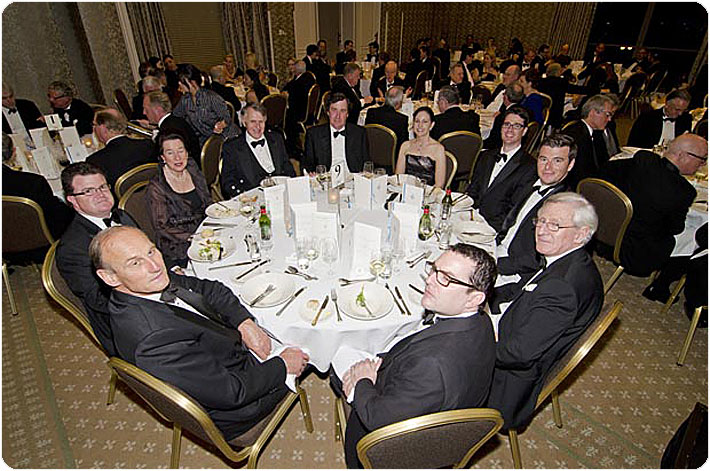


 It is indeed a privilege to be asked to give this toast tonight because of the great respect and affection I have for a number of judges before whom I have appeared and with whom I have enjoyed many extramural activities.
It is indeed a privilege to be asked to give this toast tonight because of the great respect and affection I have for a number of judges before whom I have appeared and with whom I have enjoyed many extramural activities. I mention in that regard that the Chief Justice of Canada is to present an address in the Banco Court in Brisbane tomorrow evening on the subject “The Courts and the Media”, which I am sure will be most interesting, and a great honour to the court in this its sesquicentenary year.
I mention in that regard that the Chief Justice of Canada is to present an address in the Banco Court in Brisbane tomorrow evening on the subject “The Courts and the Media”, which I am sure will be most interesting, and a great honour to the court in this its sesquicentenary year.
 nevertheless combine to render regional appointments especially significant. Throughout my judicial career, the regions and the State have been very well served by the regional Judges, who have additionally assumed with great impact high leadership roles in relation to the regional professions, including the judiciary, and the regional communities. I am confident Justice Henry will do likewise.
nevertheless combine to render regional appointments especially significant. Throughout my judicial career, the regions and the State have been very well served by the regional Judges, who have additionally assumed with great impact high leadership roles in relation to the regional professions, including the judiciary, and the regional communities. I am confident Justice Henry will do likewise.
 The judges are, of course, indebted to Mr Hughes for his good natured toast and for the confidence, which I think he has expressed, in our capacity to perform our arduous duty. We judges are human. Part of our human frailty is to enjoy flattery and Mr Hughes is practised in those arts. He may indeed have learned something from Justice White’s address last year.
The judges are, of course, indebted to Mr Hughes for his good natured toast and for the confidence, which I think he has expressed, in our capacity to perform our arduous duty. We judges are human. Part of our human frailty is to enjoy flattery and Mr Hughes is practised in those arts. He may indeed have learned something from Justice White’s address last year. There may be another reason why you drink our health. It may be that you are profoundly grateful that we are not worse than we are. Bye and large the judges before whom you appear are competent and conscientious. There is much to be said for that accomplishment. It is not hard to find in times and places not far removed examples of very bad judges.
There may be another reason why you drink our health. It may be that you are profoundly grateful that we are not worse than we are. Bye and large the judges before whom you appear are competent and conscientious. There is much to be said for that accomplishment. It is not hard to find in times and places not far removed examples of very bad judges. 